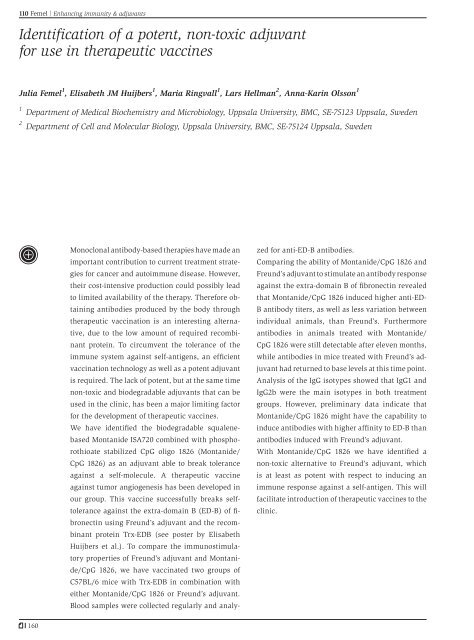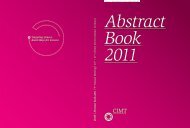Abstract Book 2010 - CIMT Annual Meeting
Abstract Book 2010 - CIMT Annual Meeting
Abstract Book 2010 - CIMT Annual Meeting
You also want an ePaper? Increase the reach of your titles
YUMPU automatically turns print PDFs into web optimized ePapers that Google loves.
110 Femel | Enhancing immunity & adjuvants<br />
Identification of a potent, non-toxic adjuvant<br />
for use in therapeutic vaccines<br />
Julia Femel 1 , Elisabeth JM Huijbers 1 , Maria Ringvall 1 , Lars Hellman 2 , Anna-Karin Olsson 1<br />
1 Department of Medical Biochemistry and Microbiology, Uppsala University, BMC, SE-75123 Uppsala, Sweden<br />
2 Department of Cell and Molecular Biology, Uppsala University, BMC, SE-75124 Uppsala, Sweden<br />
160<br />
Monoclonal antibody-based therapies have made an<br />
important contribution to current treatment strategies<br />
for cancer and autoimmune disease. However,<br />
their cost-intensive production could possibly lead<br />
to limited availability of the therapy. Therefore obtaining<br />
antibodies produced by the body through<br />
therapeutic vaccination is an interesting alternative,<br />
due to the low amount of required recombinant<br />
protein. To circumvent the tolerance of the<br />
immune system against self-antigens, an efficient<br />
vaccination technology as well as a potent adjuvant<br />
is required. The lack of potent, but at the same time<br />
non-toxic and biodegradable adjuvants that can be<br />
used in the clinic, has been a major limiting factor<br />
for the development of therapeutic vaccines.<br />
We have identified the biodegradable squalenebased<br />
Montanide ISA720 combined with phosphorothioate<br />
stabilized CpG oligo 1826 (Montanide/<br />
CpG 1826) as an adjuvant able to break tolerance<br />
against a self-molecule. A therapeutic vaccine<br />
against tumor angiogenesis has been developed in<br />
our group. This vaccine successfully breaks selftolerance<br />
against the extra-domain B (ED-B) of fibronectin<br />
using Freund’s adjuvant and the recombinant<br />
protein Trx-EDB (see poster by Elisabeth<br />
Huijbers et al.). To compare the immunostimulatory<br />
properties of Freund’s adjuvant and Montanide/CpG<br />
1826, we have vaccinated two groups of<br />
C57BL/6 mice with Trx-EDB in combination with<br />
either Montanide/CpG 1826 or Freund’s adjuvant.<br />
Blood samples were collected regularly and analy-<br />
zed for anti-ED-B antibodies.<br />
Comparing the ability of Montanide/CpG 1826 and<br />
Freund’s adjuvant to stimulate an antibody response<br />
against the extra-domain B of fibronectin revealed<br />
that Montanide/CpG 1826 induced higher anti-ED-<br />
B antibody titers, as well as less variation between<br />
individual animals, than Freund’s. Furthermore<br />
antibodies in animals treated with Montanide/<br />
CpG 1826 were still detectable after eleven months,<br />
while antibodies in mice treated with Freund’s adjuvant<br />
had returned to base levels at this time point.<br />
Analysis of the IgG isotypes showed that IgG1 and<br />
IgG2b were the main isotypes in both treatment<br />
groups. However, preliminary data indicate that<br />
Montanide/CpG 1826 might have the capability to<br />
induce antibodies with higher affinity to ED-B than<br />
antibodies induced with Freund’s adjuvant.<br />
With Montanide/CpG 1826 we have identified a<br />
non-toxic alternative to Freund's adjuvant, which<br />
is at least as potent with respect to inducing an<br />
immune response against a self-antigen. This will<br />
facilitate introduction of therapeutic vaccines to the<br />
clinic.



